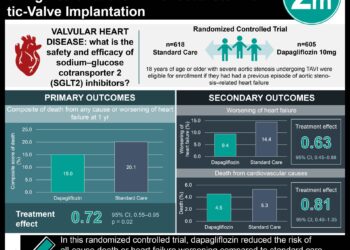Prematurity linked to increased risk of heart failure in adulthood
1. Across all age groups at the time of diagnosis, younger gestational ages were associated with an increased risk of developing heart failure later in life.
Evidence Rating Level: 2 (Good)
Study Rundown: Preterm birth is an extremely common condition affecting mothers worldwide. The association between preterm birth and various cardiac and metabolic disorders has been studied in the past. Previously, however, population-based studies on association of gestation age on adult-onset heat failure were lacking. This cohort study followed nearly all patients in Sweden born since 1973 based on Swedish Birth Registers. The earliest diagnoses of heart failure were included until 2015. Across all ages at the time of diagnosis, younger gestational ages were associated with increased risk of developing heart failure. Excluding individuals with congenital anomalies, the risk estimates remain elevated in individuals born prematurely with an inverse relationship between gestational age and associated risk of heart failure. One strength of this study is utilizing a Swedish national population-based study to generate a large sample size, enabling high statistical power of the study. Offering a fresh perspective on the potential impacts of gestational age in mid-adult life, the study also provided a longitudinal risk estimates from childhood to adulthood at each different age. However, echocardiogram and other imaging modalities data were not used to verify heart failure diagnosis nor to further classify disease subtype and severity. The high positive predictive value of heart failure in the general population in Sweden also decreased the external validity of the study. In addition, genetic and environmental contributions such as lifestyle and smoking history were not examined in this study.
Click to read the study in JAMA
Click to read an accompanying editorial in Journal of the American College of Cardiology
Relevant Reading: Preterm Birth and Risk of Heart Failure Up to Early Adulthood
In-Depth [retrospective cohort]: In this Swedish population-based cohort study, the gestational age was inversely linked to increased risk of heart failure in early and mid-adulthood. The risk was associated with the younger gestational age and highest in those born extremely prematurely (<28 weeks) with an adjusted incidence rate ratio of 17.0 [95%CI, 7.96-36.3]. There is no significantly increased risk between late preterm, those born between 32 and 36 weeks, and full term. Notably, the risk estimates after adjusting for perinatal and maternal factors drops precipitously with longer duration of follow up in adulthood, while remaining significantly elevated into adulthood compared to those born at full term.
Image: PD
©2020 2 Minute Medicine, Inc. All rights reserved. No works may be reproduced without expressed written consent from 2 Minute Medicine, Inc. Inquire about licensing here. No article should be construed as medical advice and is not intended as such by the authors or by 2 Minute Medicine, Inc.







![Teixobactin appears to avoid bacteria resistance [PreClinical]](https://www.2minutemedicine.com/wp-content/uploads/2015/01/18170_lores-75x75.jpg)